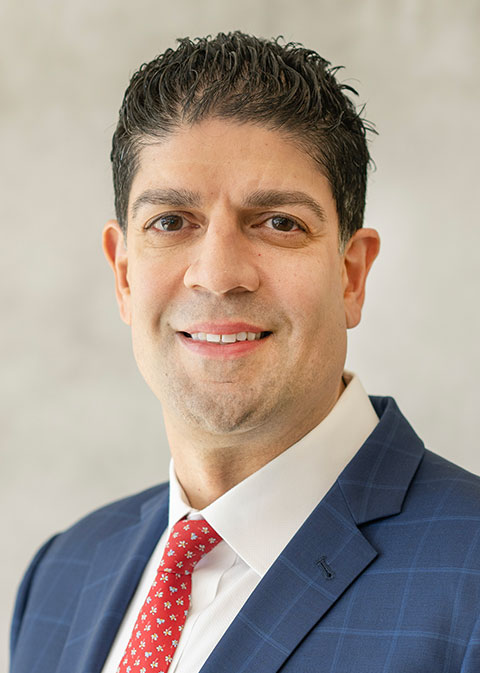
Emergency and hospitalist medicine offers high-quality service from pre-hospital through discharge.
High-quality healthcare happens when delivery is coordinated, with all specialties working closely together. That’s why leaders in emergency services and hospitalist medicine at RWJBarnabas Health (RWJBH) prioritize collaborating to ensure consistent best practices across all of the system’s hospitals.

“In the traditional model, healthcare providers work in silos,” says Christopher Freer, DO, Senior Vice President of Emergency and Hospitalist Medicine. “But to deliver the best care, it’s important that providers know exactly what has transpired with each patient—what worked, what didn’t, what to do to continue the treatment plan. At RWJBH, we emphasize evidence-based practices and strong, clear handoffs between providers at every stage in the patient’s journey.” Those stages follow.
On the Road to Treatment
“Our Mobile Health team has a special focus on excellent, safe transitions from the community setting to the Emergency Department [ED] and then from hospital to home or the next appropriate level of care,” says James Smith, Vice President, Mobile Health.
For a sick patient, the pre-hospital experience before the ambulance arrives at the ED doors is a vulnerable time. To best respond, the Mobile Health team has created standard protocols for 911 calls.
A specialist first asks the patient specific questions while dispatching an ambulance and perhaps a paramedic unit. A specialized algorithm analyzes patient information from the 911 call to suggest next questions and actions.
“This system ensures that we get the the right information from every call and communicate it to everyone who needs it,” says Anthony Raffino, Assistant Vice President, Emergency and Transportation Services, RWJBH Mobile Health.
Hands-on care begins when emergency medical technicians or paramedics arrive and continues all the way to the ED, where physicians have already seen the patient’s information on their computers.
If a patient needs advanced care such as treatment in a Trauma Center like those at Jersey City Medical Center or Robert Wood Johnson University Hospital in New Brunswick, or a Comprehensive Stroke Center, an ED doctor can make just one call—to the RWJBH Patient Transfer Center.
In the Emergency Department
RWJBH hospitals see 750,000 ED visits annually, the greatest number in the state, says Dr. Freer. “In each ED, our goal is an empty or nearly empty waiting room,” he says. “To accomplish this, we have a process in place in which you are seen immediately by a nurse upon arrival and are provided immediate bedding as appropriate whenever possible.” The nurse obtains information, creates a wristband and assesses where you should go next.
Many patients need diagnostic testing and are placed in an ED patient room to be seen by the full care team (including a doctor, nurse, physician assistant, medical scribe and other specialists), ideally within 30 minutes. During downtime such as when a patient is waiting for a test, the collection of clerical information is completed.
“Our system’s investment in the Epic Electronic Health Records software system has made the flow of patient care very efficient,” Dr. Freer says. “Epic allows us to standardize processes at every ED, and to create dashboards and build metrics from the minute a patient comes into the hospital.”
On a Medical Floor
Patients admitted to a hospital from the ED fall under the care of a hospitalist—a specialist with extensive training in inpatient care.

Abraham, MD, MBA, SFHM
“The handoff from the ED to the hospitalist is very important,” says Maninder (‘Dolly’) Abraham, MD, MBA, SFHM, Chief of Hospitalist Medicine. “To ensure consistency, we have created a standardized handoff script for each hospital to use.” The hospitalist will see admitted patients regularly during rounds with the entire care team. Informing the team of each patient’s anticipated discharge date helps ensure that all needs—from final tests to physical therapy to plans for home care—are addressed in a timely fashion.
“We have scripts for everything, such as when to escalate a case or what to put in a discharge summary,” says Dr. Abraham. “This allows us to move patients efficiently through a complicated healthcare system. That’s the beauty of having a service line to oversee all aspects of care.”
In Critical Cases

FCCP, FCCM
“If an ED doctor or hospitalist assesses that a patient needs intensive care, they call the hospital’s ICU team, and we come right away,” says Fariborz Rezai, MD, System Director of Critical Care Medicine at RWJBH. “Our intensivist teams are highly organized and include advanced practice providers, residents, fellows, nurses and much more, working closely with a patient’s regular physician.”
As in other parts of emergency services and hospitalist medicine, critical teams discuss best practices during regular systemwide and hospitalspecific meetings. “We make sure we’re standardizing care and using the same tools in all our hospitals, from devices and medications to new guidelines and research,” says Dr. Rezai.
The true key to the success of emergency services and hospitalist medicine across the system is its collaborative spirit, says Dr. Freer. “No one is siloed,” he says. “We are one giant team of providers.”
Timely Transfers for Specialized Care
Patients who need specialized care beyond the scope of what is available at a given hospital can be transferred to the RWJBarnabas Health (RWJBH) hospital best suited to provide the needed services with one call to the RWJBH Patient Transfer Center. The center connects with a receiving provider, coordinates bed placement and transportation, and communicates the patient’s clinical information. The Mobile Health team then helps make the transfer, whether via ambulance or helicopter.
Learn more about emergency medicine at RWJBarnabas Health. If you are having an emergency, call 911 immediately.
 View full issues of Healthy Together magazine by New Jersey region:
View full issues of Healthy Together magazine by New Jersey region: